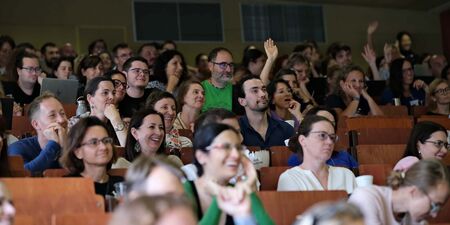
Open Space Conference 2024: How Artificial Intelligence and More are Transforming Education
On September 11, 2024, the Faculty of Informatics at Masaryk University hosted the 14th annual Open Space Conference (OSC) on e-learning within the IS MU system. This year’s focus was on the role of artificial intelligence (AI) in education, attracting educators and experts from across the university.
The conference was opened by Vice-Rector Radim Polčák, who emphasized the importance of quality in educational content. He noted that the goal is not to produce a quantity of materials but to ensure that technology, such as AI, fosters a more profound understanding of teaching. Dean of the Faculty of Informatics Jiří Barnat followed with a welcome, stressing that tools developed by informatics should genuinely serve users and support meaningful content. IS MU development team leader Assoc. Prof. Michal Brandejs also delivered opening remarks, sharing his experience with AI in student projects and highlighting the importance of thorough originality checks.
First Presentation Block: AI in Education and Effective Planning
The first block was opened by Prof. Josef Krob, Ph.D., with a lecture titled "AI in Education: A Playful Approach and the Lazy Teacher." He shared his experiences implementing various AI teaching tools, which he and his students used. Practical demonstrations showed how AI can enliven traditional education and foster interactivity. His presentation sparked a lively discussion on AI's role in originality assessment and preventing clichés in student work, emphasizing the need to teach students how to ask meaningful questions and develop critical thinking when working with AI tools. The following presentation, "Planning and Flexibility as Key Skills for Teachers (Not Only) in Hybrid Education," was led by Petr Sucháček, M.A. He discussed effective planning and teaching techniques and the importance of building strong student-teacher relationships. He also shared practical tips on motivating students to participate actively.
Second Presentation Block: Innovative Methods and Technologies in Teaching
The second block was opened by Kateřina Chudová, M.A., with an interactive presentation on using escape games in teaching legal English. Participants could try an online escape game and compete for a creative reward. The discussion focused on balancing the playfulness and seriousness of this method and its potential for use in offline settings. The following lecture was led by Alžběta Šašinková, Ph.D., who discussed immersive virtual reality (VR) in teaching. She shared her research and pedagogical experiences with VR, including its use in geography, language instruction, and support for adolescent mental health. She highlighted VR's challenges and limitations, noting when it is most effective in teaching. Discussions also touched on collaboration with gaming studios and practical aspects of VR implementation in education.
Third Presentation Block: Legal Aspects of AI and Updates in IS MU
The third block's first lecture, delivered by Assoc. Prof. Matěj Myška, Ph.D., focused on generative AI from a copyright perspective. He addressed questions about the legal protection of AI-generated outputs, copyright ownership, and the conditions for using popular AI tools in academia. The presentation by Tomáš Obšívač, Ph.D., followed, focusing on updates in the IS MU Questionnaires application. He introduced significant changes and improvements, such as a more precise evaluation of responses, an enhanced answer review feature, and other functions to facilitate teachers' work. The conference concluded with a presentation by Jitka Daňková, M.A., who reviewed updates in IS MU. She introduced features in the Tudle and KvIS applications, a new option to report inappropriate content, and upcoming projects, such as versioning interactive syllabi and a new mobile notification app.
The conference also included popular informational and consultation booths. Participants could consult with e-technicians and the E-learning Support Center staff about e-learning applications and multimedia content in teaching. Another booth focused on plagiarism detection, where the "Compare Two" feature was particularly appreciated. The conference concluded with a prize draw where participants answered, "If you could delegate one responsibility to AI, what would it be?" Common answers included household cleaning, administrative tasks, and responding to recurring student inquiries. This year's Open Space Conference offered practical demonstrations of modern technology in teaching and inspiring discussions on their future development. The event's pleasant atmosphere and rich program contributed to its success, highlighting the importance of innovation in education. I look forward to next year's event, which the organizers already plan.
Program and presentations from the conference: https://is.muni.cz/do/rect/el/prezentace/osk2024/index.html#faq-problem-registrace
Conference posts:
https://is.muni.cz/clanky/2024_konference_elearning
https://is.muni.cz/blog/is_info/nov_20241017_osk_2
- Web address
- Attachments